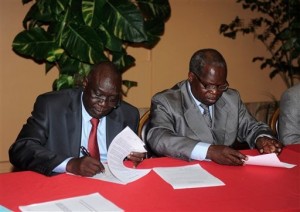

Follow us on:  
|


Seleka rebel alliance leader Michel Djotodia (left), and Jean Willybiro Sako, head of the CAF’s government delegation to the peace talks, sign a peace agreement, in Libreville, Gabon [AP]
The rebel factions, known collectively as the Seleka Coalition, agreed to allow Bozize to remain in power until 2016 in exchange for his pledge to form a national unity government led by a prime minister chosen by the opposition.
Bozize is expected to dissolve the current government on Saturday.
The UN Security Council welcomed the ceasefire and peace agreement, which came after three days of negotiations in Libreville, Gabon.
A statement from the Council “emphasized the necessity of an expeditious implementation of these agreements and called on all parties to implement them in good faith”.
It also “commended the swift efforts made by the Economic Community of the Central African States, by the African Union and by the countries in the region to solve the recent crisis”.
Neighbouring countries Chad, Cameroon, Gabon and the Republic of Congo had sent military contingents as part of the Central African Multinational Force (Fomac) to help the CAR military fight off the rebels in late December.
South Africa had also sent in forces.
The rebels had made major military gains against government forces in recent weeks, coming to within 70km of the capital Bangui in their bid to overthrow Bozize, a military officer who seized power in 2003 and had been elected president twice since then.
A future national unity government will have to work toward combating the severe poverty that has plagued the country since independence from France in 1960 despite possessing vast agricultural, water and mineral resources, including uranium, gold and diamonds.
Source: Agencies